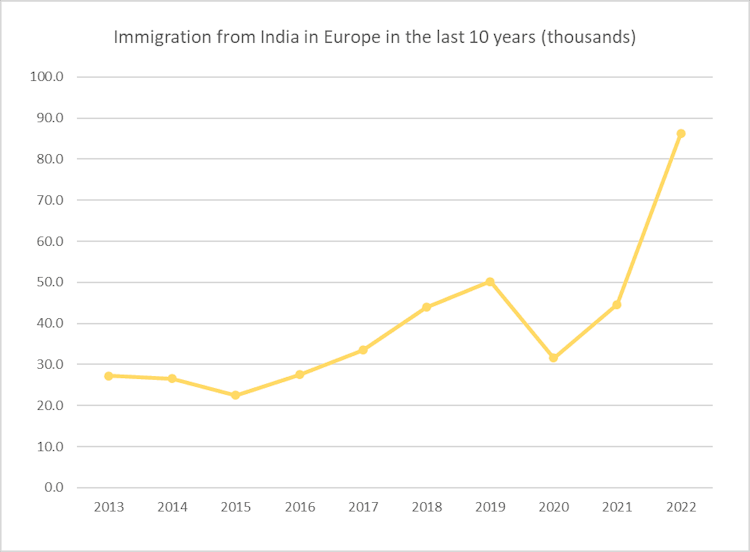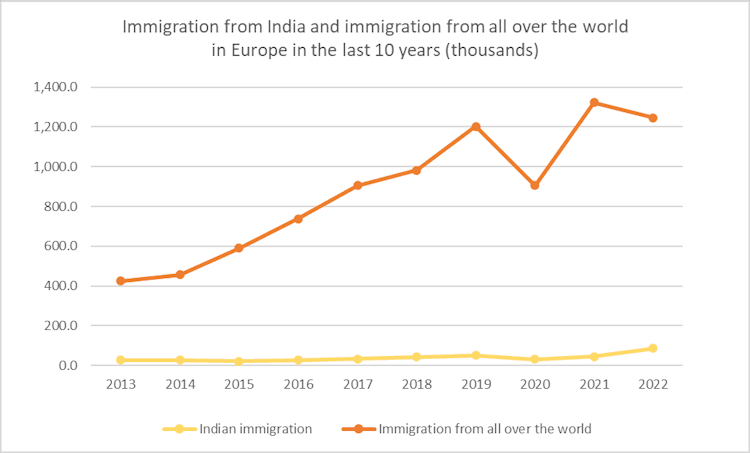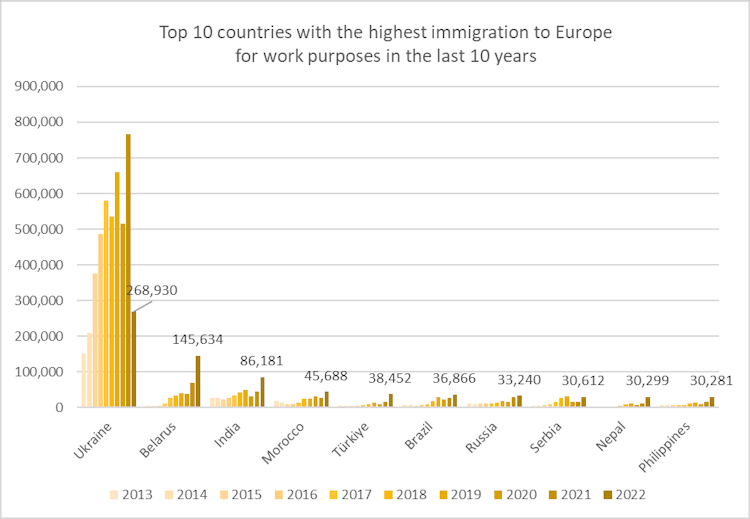
How to get a job in Europe from India
Navigating the path to employment in Europe from India can be both exciting and daunting. The requirements, job portals, visa considerations, and diverse cultural aspects can easily overwhelm. So here is our complete guide to employment for Indian nationals in Europe.
Europe is an alluring destination for expatriates, sought after for its rich cultural tapestry, historical significance, and high standard of living. Increasingly, individuals worldwide, including many from India, are setting their sights on the Old Continent for employment opportunities, either to escape economic challenges or to secure a more lucrative salary.
How many Indians come to Europe to work?
Europe stands as a highly attractive destination for employment, drawing an increasing number of individuals each year. In 2022, a notable 86,181 Indians immigrated to Europe for work, showcasing a consistent upward trend over the past decade, with a noteworthy surge nearly doubling from 2021 to 2022. The sole exception to this ascent was in 2020, marked by a reduction in immigration due to the COVID crisis.
While the percentage of Indians arriving in Europe for work might seem relatively small in relation to the overall immigration, as depicted in the following graph, a more revealing perspective emerges when compared to immigration from other countries worldwide. In this context, Indian immigration claims the third spot, surpassed only by Ukraine and Belarus.
Step-by-step process on how to get a job in Europe from India
Having explored the statistics to gain a better understanding of the landscape, it's now time to dive into the practical steps. Let's navigate, step by step, what you need to do to secure a job and migrate to Europe from India.
To simplify your decision-making process, consider these five fundamental aspects:
Professional Opportunities
Labor Conditions
Climate
Cost of Living and Accommodation
Quality of Life
Proximity to Family and Friends
Several destinations may align with your preferences and needs. What's crucial is being aware of the specificities of each country.
If you're seeking employment in a non-English-speaking country, all is not lost. Depending on your industry and the nature of the job, you may find opportunities even without knowing the native language. The key lies in the sector you're involved in and the specific job requirements.
It's essential to consider that while you might secure a job speaking only English, integrating into the country in the long run may require learning the native language. Plan to attend language classes or utilize online resources such as language learning apps and websites to enhance your language skills.
If the language proficiency of the local language is a contractual requirement in your field, your options narrow down. You can either opt for an English-speaking country or commit to learning the language of your destination country. Failing to meet language requirements may significantly limit your job prospects.
Regardless of the chosen design, the purpose of a resume is to highlight the applicant's value to any selection committee. It serves as the applicant's introduction and is the most critical document in any recruitment process.
Essentially, it summarizes academic and professional experiences, achievements, and competencies relevant to the desired position. Your resume should be easy to read and provide a clear explanation of why you are qualified for the position you're applying for.
Making an impact requires presenting a resume that stands out from the competition, but it's essential to adhere to certain standards. In Europe, CVs generally follow a standardized format, offering flexibility but within certain constraints. For instance, the CV of someone just starting their career or with a few years of experience should not exceed one page.
Variations also exist based on your field; a graphic designer's CV may accept certain features that might not be as well-received in an engineer's CV. Given the intricacies, it's advisable to start by exploring the European CV model. There, you can create your CV using interactive tools tailored to European standards. You can also learn how to write a strong CV. See our dedicated resources on this topic.
If the competent authorities in your chosen country identify significant differences between your education and theirs, you may need to undergo an adaptation course or an aptitude test to secure recognition. In some countries, this homologation process can take three to six months, so it's crucial to inquire about it early on to avoid potential issues and delays.
Internet
Network
Due to the broad range of circumstances, detailing the documents and requirements for each case would be extensive. Instead, we guide you to the European Union immigration page, where you can easily find all the necessary information. Simply select your destination country and the purpose of your immigration to access tailored information for your case.
It's essential to note that in almost all countries, you'll need to secure a job and obtain a work contract before applying for a work visa. This underscores the significance of the job search and application process as a prerequisite for the visa application.
If you're interested in working in Luxembourg, we recommend checking our article on "How to obtain a visa for Luxembourg for Indian citizens".
Tasks include finding a place to live, organizing the transportation of your belongings, opening bank accounts, setting up utilities, phone services, and much more. Begin planning well in advance, as the list is extensive. Whether you're making a solo move or relocating your entire family, careful planning is key to ensuring a smooth transition from India to Europe.
However, cultural understanding isn't achieved solely through study; it requires interacting with locals once you arrive and building friendships there. Hence, mastering the local language is important. Even if you can communicate in English, establishing friendships and integrating into the culture will likely require proficiency in the native language of the country. Engage with the local community, immerse yourself in their way of life, and cultivate connections for a more enriching experience in your new home.
Read article
Frequently Asked Questions (FAQ)
How to decide which is the best European country to work in?
To determine the ideal European country, consider factors like job opportunities in your field, language preferences, and the cost of living. Research cultural aspects, lifestyle, and potential for personal and professional growth. Networking with expatriates, exploring online forums, and seeking advice from professionals in your industry can provide valuable insights. Ultimately, align your choice with both career objectives and the quality of life you seek, ensuring a harmonious fit between work and lifestyle.
Do I need to learn the native language of the destination country to work?
How can I create a strong resume that aligns with European standards?
Craft a concise, one-page CV emphasizing qualifications, experience, and achievements. Tailor it to the specific job and follow the preferred format in the destination country. Utilize online tools like Europass for guidance.
Source: ec.europa.eu, getgis.org, www.y-axis.com, europa.eu
We took photos from these sources: Photo by Ketut Subiyanto for Pexels


